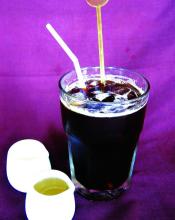Introduction to the flavor and taste characteristics of delightful Dominica boutique coffee beans
Unlike coffee grown in Haiti, coffee grown in the Dominican Republic is mostly washed, a sign of high quality. Miniga Coffee uses water washing to treat coffee beans, so that the quality of treated coffee beans is more guaranteed. Coffee beans treated with water washing method retain more original flavor than drying method, and the aroma is pure and soft.
This method of carefully selected, high-quality Dominican coffee, exudes a light aroma, drinking people can feel a faint fruity taste, lingering aftertaste, smooth and smooth In the early 18th century, coffee from Martinique to Domiga, represented by the northern region of Ciba and the southern region including Ocayabani Santo Domingo, producing fine coffee. Among them, Santo Domingo and Bani produced coffee, almost synonymous with Domica coffee, is world-famous quality coffee. Santo Domingo coffee, characterized by fresh and elegant, full particles, excellent acidity, pleasant aroma, so value for money. Dominican coffee selection is generally done manually. The main basis for selection is according to the fullness of coffee particles, whether uniform, and then divided into grades. Generally speaking, coffee with full and uniform particles is easier to preserve. The Dominican Republic is located east of Haiti in the middle of the West Indies, north of the Atlantic Ocean and south of the Caribbean Sea. With an area of about 49000 square kilometers and a population of 7.1 million, the Dominican Republic coexists with the Republic of Haiti on an island adjacent to Haiti. Like its neighbors, the dominican republic has a history of revolution and poverty, but now it has democratic elections and relative stability. Santo domingo is a 500-year-old city. Coffee produced in Santo Domingo and Bani is almost synonymous with Domica coffee and is world-famous for its high quality coffee. Flavor and taste characteristics: fresh and elegant, full particles, excellent acidity, pleasant aroma

Important Notice :
前街咖啡 FrontStreet Coffee has moved to new addredd:
FrontStreet Coffee Address: 315,Donghua East Road,GuangZhou
Tel:020 38364473
- Prev

Introduction to the taste of Bolivian boutique coffee beans with rich and unique aroma
Bolivia not only has a unique growing environment, but also has an excellent coffee variety Typica. In the past two hundred years, the main variety of coffee in Yanggas area is the ancient Tibica. Tibica coffee has a balanced and soft flavor, with lively aroma and rich sour taste. Unfortunately, the low production of Tibika and its poor disease resistance make Bolivia's
- Next

Introduction to the flavor and taste characteristics of Puerto Rican coffee with unique taste
Puerto Rico's coffee beans are carefully planted, pure, aromatic and heavy, of which the best coffee is Yauco Selecto, which means Selecto. Yaocote Coffee is grown only on three farms in the southwest of the island, San Pedro, Caracolillo and La Juanita. It is a truly high-quality coffee with a strong flavor and a long aftertaste. Puerto Rico
Related
- Detailed explanation of Jadeite planting Land in Panamanian Jadeite Manor introduction to the grading system of Jadeite competitive bidding, Red bid, Green bid and Rose Summer
- Story of Coffee planting in Brenka region of Costa Rica Stonehenge Manor anaerobic heavy honey treatment of flavor mouth
- What's on the barrel of Blue Mountain Coffee beans?
- Can American coffee also pull flowers? How to use hot American style to pull out a good-looking pattern?
- Can you make a cold extract with coffee beans? What is the right proportion for cold-extracted coffee formula?
- Indonesian PWN Gold Mandrine Coffee Origin Features Flavor How to Chong? Mandolin coffee is American.
- A brief introduction to the flavor characteristics of Brazilian yellow bourbon coffee beans
- What is the effect of different water quality on the flavor of cold-extracted coffee? What kind of water is best for brewing coffee?
- Why do you think of Rose Summer whenever you mention Panamanian coffee?
- Introduction to the characteristics of authentic blue mountain coffee bean producing areas? What is the CIB Coffee Authority in Jamaica?

